# deephaven-ib


An [Interactive Brokers](https://www.interactivebrokers.com/) integration for [Deephaven](https://deephaven.io).
[Interactive Brokers](https://www.interactivebrokers.com/) is a very popular brokerage in the quantitative finance world,
with about $200B of customer equity. Quants and hedge funds often choose [Interactive Brokers](https://www.interactivebrokers.com/) because of its low trading costs and API that facilitates automated trading. With low minimum account balances,
it is also an attractive choice for individual investors.
[Deephaven](https://deephaven.io) is the real-time query engine that is the backbone for the quantitative trading of the
world's largest hedge funds, banks, and exchanges. [Deephaven](https://deephaven.io) makes working with real-time data easy and
facilitates very concise and easy-to-read code. With [Deephaven](https://deephaven.io), quants can create new models
and get them into production quickly, traders can monitor the market and their portfolios, and
managers can monitor risk.
[deephaven-ib](https://github.com/deephaven-examples/deephaven-ib) combines the low-cost trading of
[Interactive Brokers](https://www.interactivebrokers.com/) with the analytical power and ease of use of
[Deephaven Community Core](https://github.com/deephaven/deephaven-core) to yield an open, quantitative
trading platform. Basically, it provides an open platform for building quantitative trading strategies and
custom analytics. You can build something simple, like a portfolio monitor, or something complex, like a
fully-automated, multi-strategy quantitative hedge fund.
[deephaven-ib](https://github.com/deephaven-examples/deephaven-ib) supports trading essentially all common
exchange traded products. These include:
* Stocks
* Mutual Funds
* Options
* Futures
* Futures Options
* Indexes
* Bonds
* Foreign Exchange (Forex or FX)
* Cryptocurrency
* Contracts for Differences (CFDs)
* Warrants
* Commodities

**WARNING: Automated trading can go horribly wrong very quickly. Verify your code on a paper trading account before
unleashing trading on an account where money can be lost. If you think this can not happen to you, read
[The Rise and Fall of Knight Capital](https://medium.com/dataseries/the-rise-and-fall-of-knight-capital-buy-high-sell-low-rinse-and-repeat-ae17fae780f6).
The [Setup](#setup) section shows configurations to prevent accidental trade submission.**
For more details, see:
* [Interactive Brokers](https://www.interactivebrokers.com/)
* [Deephaven](https://deephaven.io)
* [Deephaven Community Core](https://github.com/deephaven/deephaven-core)
For help with [deephaven-ib](https://github.com/deephaven-examples/deephaven-ib):
* [deephaven-ib Docs](https://deephaven-examples.github.io/deephaven-ib/)
* [Gitter: A relaxed chat room about all things Deephaven](https://gitter.im/deephaven/deephaven)
* [Deephaven Community Slack](https://join.slack.com/t/deephavencommunity/shared_invite/zt-11x3hiufp-DmOMWDAvXv_pNDUlVkagLQ)
For Deephaven how-to guides, see:
* [Deephaven Tutorial](https://deephaven.io/core/docs/tutorials/overview/)
* [Deephaven Coummunity Core Documentation](https://deephaven.io/core/docs/).
For help with [Deephaven](https://deephaven.io):
* [Gitter: A relaxed chat room about all things Deephaven](https://gitter.im/deephaven/deephaven)
* [Deephaven Community Slack](https://join.slack.com/t/deephavencommunity/shared_invite/zt-11x3hiufp-DmOMWDAvXv_pNDUlVkagLQ)
* [Deephaven Community Core Discussions](https://github.com/deephaven/deephaven-core/discussions)
# Data Available in Deephaven
The [Deephaven](https://deephaven.io) query engine is built around the concept of tables, which are similar to Pandas dataframes.
Unlike Pandas dataframes, [Deephaven](https://deephaven.io) tables can dynamically update as new data is streamed in.
As input tables change, the [Deephaven](https://deephaven.io) query engine ensures that all queries, no matter how complex,
are kept up-to-date.
Once data is converted to a [Deephaven](https://deephaven.io) table, it can be used in queries with any other
[Deephaven](https://deephaven.io) tables.
## IB TWS data
Data available from [IB Trader Workstation (TWS)](https://www.interactivebrokers.com/en/trading/tws.php) can be accessed
as [Deephaven](https://deephaven.io) tables by using [deephaven-ib](https://github.com/deephaven-examples/deephaven-ib).
As data streams in, the tables and queries using them will automatically update.
These tables include:
* General
* `errors`: an error log
* `requests`: requests to IB
* Contracts
* `contract_details`: details describing contracts of interest. Automatically populated.
* `contracts_matching`: contracts matching query strings provided to `request_contracts_matching`.
* `market_rules`: market rules indicating the price increment a contract can trade in. Automatically populated.
* `short_rates`: interest rates for shorting securities. Automatically populated if `download_short_rates=True`.
* Accounts
* `accounts_managed`: accounts managed by the TWS session login. Automatically populated.
* `accounts_family_codes`: account family. Automatically populated.
* `accounts_groups`: account groups. Automatically populated.
* `accounts_allocation_profiles`: allocation profiles for accounts. Automatically populated.
* `accounts_value`: account values. Automatically populated.
* `accounts_overview`: overview of account details. Automatically populated.
* `accounts_summary`: account summary. Automatically populated.
* `accounts_positions`: account positions. Automatically populated.
* `accounts_pnl`: account PNL. Automatically populated.
* News
* `news_providers`: currently subscribed news sources. Automatically populated.
* `news_bulletins`: news bulletins. Automatically populated.
* `news_articles`: the content of news articles requested via `request_news_article`.
* `news_historical`: historical news headlines requested via `request_news_historical`.
* Market Data
* `ticks_price`: real-time tick market data of price values requested via `request_market_data`.
* `ticks_size`: real-time tick market data of size values requested via `request_market_data`.
* `ticks_string`: real-time tick market data of string values requested via `request_market_data`.
* `ticks_efp`: real-time tick market data of exchange for physical (EFP) values requested via `request_market_data`.
* `ticks_generic`: real-time tick market data of generic floating point values requested via `request_market_data`.
* `ticks_option_computation`: real-time tick market data of option computations requested via `request_market_data`.
* `ticks_trade`: real-time tick market data of trade prices requested via `request_tick_data_historical` or `request_tick_data_realtime`.
* `ticks_bid_ask`: real-time tick market data of bid and ask prices requested via `request_tick_data_historical` or `request_tick_data_realtime`.
* `ticks_mid_point`: real-time tick market data of mid-point prices requested via `request_tick_data_historical` or `request_tick_data_realtime`.
* `bars_historical`: historical price bars requested via `request_bars_historical`.
* `bars_realtime`: real-time price bars requested via `request_bars_realtime`.
* Order Management System (OMS)
* `orders_submitted`: submitted orders **FOR THE THE CLIENT'S ID**. A client ID of 0 contains manually entered orders. Automatically populated.
* `orders_status`: order statuses. Automatically populated.
* `orders_completed`: completed orders. Automatically populated.
* `orders_exec_details`: order execution details. Automatically populated.
* `orders_exec_commission_report`: order execution commission report. Automatically populated.
Most tables include a `ReceiveTime` column. This column indicates the time the data was received by [deephaven-ib](https://github.com/deephaven-examples/deephaven-ib). It does not represent the time the event occurred.
## Your data
You may want to combine data from other sources with your IB data. [Deephaven](https://deephaven.io) can load data from:
* [CSV](https://deephaven.io/core/docs/how-to-guides/csv-import/)
* [Parquet](https://deephaven.io/core/docs/how-to-guides/parquet-flat/)
* [Kafka](https://deephaven.io/core/docs/how-to-guides/kafka-topics/).
See the [Deephaven Documentation](https://deephaven.io/core/docs) for details.
Files placed in the `./docker/data/` directory are visible in the Docker container at `/data/`.
See [Access your file system with Docker data volumes](https://deephaven.io/core/docs/conceptual/docker-data-volumes/) for details.
# Run deephaven-ib
Follow these steps to run a [Deephaven](https://deephaven.io) plus [Interactive Brokers](https://interactivebrokers.com) system.
**Windows users need to run the commands in WSL.**
## Setup
To setup and configure the system:
1) Follow the [Deephaven Quick Start Guide](https://deephaven.io/core/docs/tutorials/quickstart/) to get [Deephaven](https://deephaven.io) running.
2) Follow the [TWS Installation Instructions](https://www.interactivebrokers.com/en/trading/tws.php) to get [IB Trader Workstation (TWS)](https://www.interactivebrokers.com/en/trading/tws.php) running.
3) Launch [IB Trader Workstation (TWS)](https://www.interactivebrokers.com/en/trading/tws.php).
4) In [IB Trader Workstation (TWS)](https://www.interactivebrokers.com/en/trading/tws.php), click on the gear in the
upper right corner. 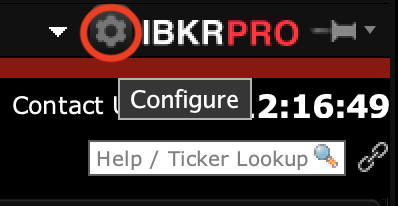
In `API->Settings`, make sure:
* "Enable ActiveX and Socket Clients" is selected.
* "Allow connections from localhost only" is not selected.
* "Read-Only API" is selected if you want to prevent trade submission from [deephaven-ib](https://github.com/deephaven-examples/deephaven-ib).
Also, note the "Socket port" value. It is needed when connecting [deephaven-ib](https://github.com/deephaven-examples/deephaven-ib).
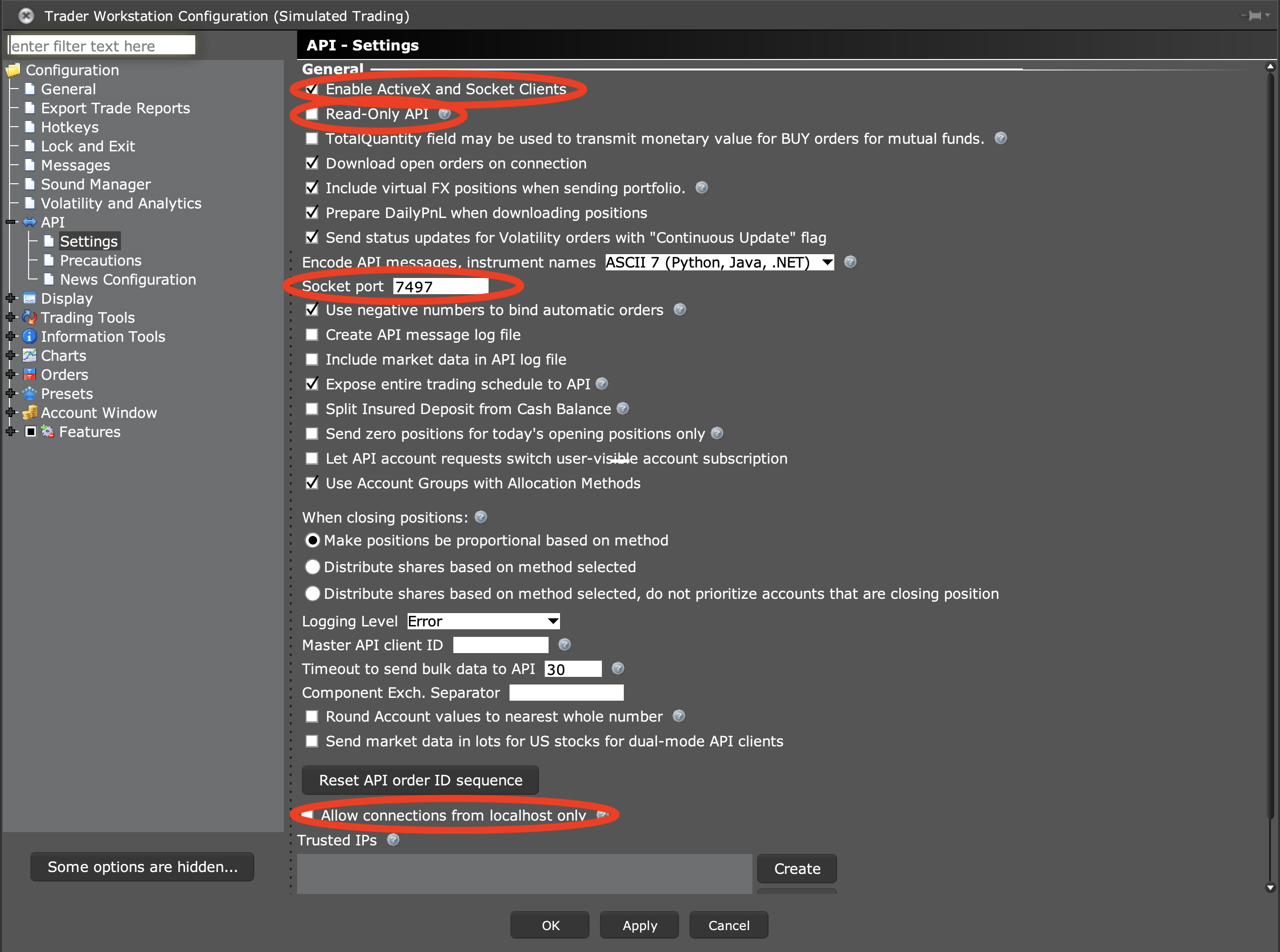
5) [For Paper Trading] Log into the [Interactive Brokers Web Interface](https://interactivebrokers.com/).
6) [For Paper Trading] In the [Interactive Brokers Web Interface](https://interactivebrokers.com/), navigate to `Account->Settings->Paper Trading Account` and make sure that "Share real-time market data subscriptions with paper trading account?" is set to true.
7) Once [deephaven-ib](https://github.com/deephaven-examples/deephaven-ib) is launched (see [below](#launch)), accept incoming connections to [IB Trader Workstation (TWS)](https://www.interactivebrokers.com/en/trading/tws.php). (May not be required for all sessions.)
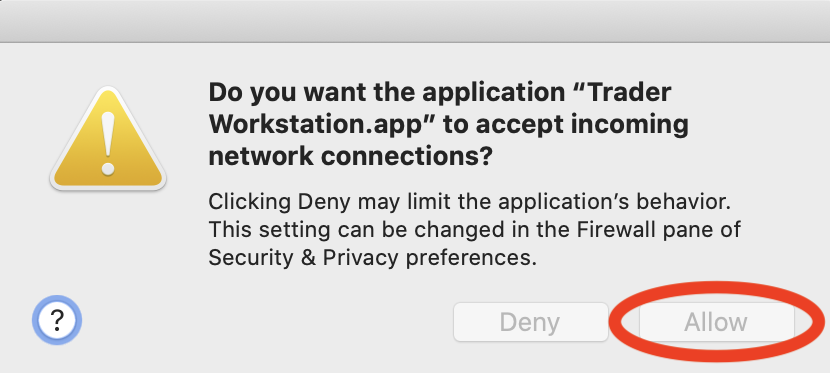
## Launch
There are multiple ways to launch [Deephaven](https://deephaven.io) with [deephaven-ib](https://github.com/deephaven-examples/deephaven-ib)
installed. The launch can either happen via a local installation or via Docker images.
For a Docker Compose example, see [docker/release/](docker/release/).
### (Option 1) Launch pip-installed Deephaven with Docker -- interactive
The pip-installed Deephaven uses a lightweight Deephaven installation that is installed using pip. In this case,
the pip-installed Deephaven system is installed in a Docker container.
1) Create a directory for your data and scripts
```bash
mkdir data
```
2) Create a directory for your Deephaven IDE configuration and notebooks
```bash
mkdir `pwd`/.deephaven
```
3) Launch the system:
```bash
# Set jvm_args to the desired JVM memory for Deephaven
docker run -it -v data:/data -v `pwd`/.deephaven:/storage -p 10000:10000 ghcr.io/deephaven-examples/deephaven-ib python3 -i -c "from deephaven_server import Server; _server = Server(port=10000, jvm_args=['-Xmx4g']); _server.start()"
```
4) Launch the [Deephaven IDE](https://github.com/deephaven/deephaven-core/blob/main/README.md#run-deephaven-ide) by navigating to [http://localhost:10000/ide/](http://localhost:10000/ide/) in a browser.
### (Option 2) Launch pip-installed Deephaven with Docker -- run a script
The pip-installed Deephaven uses a lightweight Deephaven installation that is installed using pip. In this case,
the pip-installed Deephaven system is installed in a Docker container.
This is a good option for production scenarios where scripts need to be run and related data needs to be visualized.
1) Create a directory for your data and scripts
```bash
mkdir data
# your_script.py must begin with: "from deephaven_server import Server; _server = Server(port=10000, jvm_args=['-Xmx4g']); _server.start()"
# Set jvm_args to the desired JVM memory for Deephaven
cp path/to/your_script.py data/your_script.py
```
2) Create a directory for your Deephaven IDE configuration and notebooks
```bash
mkdir `pwd`/.deephaven
```
3) Launch the system:
```bash
# Set jvm_args to the desired JVM memory for Deephaven
docker run -it -v data:/data -v `pwd`/.deephaven:/storage -p 10000:10000 ghcr.io/deephaven-examples/deephaven-ib python3 -i /data/your_script.py
```
4) Launch the [Deephaven IDE](https://github.com/deephaven/deephaven-core/blob/main/README.md#run-deephaven-ide) by navigating to [http://localhost:10000/ide/](http://localhost:10000/ide/) in a browser.
### (Option 3) Launch pip-installed Deephaven with a local installation (No Docker) -- interactive
The pip-installed Deephaven uses a lightweight Deephaven installation that is installed using pip. In this case,
the pip-installed Deephaven system is installed directly on your local system, without Docker.
It is possible to use [deephaven-ib](https://github.com/deephaven-examples/deephaven-ib) without docker, but this is a
new feature and has not been well tested. To do this:
1) Install `ibapi`:
```bash
# pip installed version of ibapi is too old. You must download and install a more recent version.
export IB_VERSION=1016.01
curl -o ./api.zip "https://interactivebrokers.github.io/downloads/twsapi_macunix.${IB_VERSION}.zip"
unzip api.zip
cd ./IBJts/source/pythonclient
python3 setup.py install
```
2) Install Java 11 and set the appropriate `JAVA_HOME` environment variable.
3) Install [deephaven-ib](https://github.com/deephaven-examples/deephaven-ib):
```bash
pip3 install --upgrade pip setuptools wheel
pip3 install deephaven-ib
```
4) Launch the system:
```bash
# Set jvm_args to the desired JVM memory for Deephaven
# Deephaven IDE configuration and notebooks are stored to ~/.deephaven
python3 -i -c "import os; from deephaven_server import Server; _server = Server(port=10000, jvm_args=['-Xmx4g','-Dstorage.path=' + os.path.expanduser('~/.deephaven')]); _server.start()"
```
5) Launch the [Deephaven IDE](https://github.com/deephaven/deephaven-core/blob/main/README.md#run-deephaven-ide) by navigating to [http://localhost:10000/ide/](http://localhost:10000/ide/) in a browser.
6) Use `host="localhost"` for the hostname in the examples (Windows WSL uses `host="host.docker.internal"`, since WSL is built on Docker.)
### (Option 4) Launch pip-installed Deephaven with a local installation (No Docker) -- run a script
The pip-installed Deephaven uses a lightweight Deephaven installation that is installed using pip. In this case,
the pip-installed Deephaven system is installed directly on your local system, without Docker.
This is a good option for production scenarios where scripts need to be run and related data needs to be visualized.
It is possible to use [deephaven-ib](https://github.com/deephaven-examples/deephaven-ib) without docker, but this is a
new feature and has not been well tested. To do this:
1) Install `ibapi`:
```bash
# pip installed version of ibapi is too old. You must download and install a more recent version.
export IB_VERSION=1016.01
curl -o ./api.zip "https://interactivebrokers.github.io/downloads/twsapi_macunix.${IB_VERSION}.zip"
unzip api.zip
cd ./IBJts/source/pythonclient
python3 setup.py install
```
2) Install Java 11 and set the appropriate `JAVA_HOME` environment variable.
3) Install [deephaven-ib](https://github.com/deephaven-examples/deephaven-ib):
```bash
pip3 install --upgrade pip setuptools wheel
pip3 install deephaven-ib
```
4) Launch the system and execute a custom script:
```bash
# your_script.py must begin with: "import os; from deephaven_server import Server; _server = Server(port=10000, jvm_args=['-Xmx4g','-Dstorage.path=' + os.path.expanduser('~/.deephaven')]); _server.start()"
# Deephaven IDE configuration and notebooks are stored to ~/.deephaven
# Set jvm_args to the desired JVM memory for Deephaven
python3 -i your_script.py
```
5) Launch the [Deephaven IDE](https://github.com/deephaven/deephaven-core/blob/main/README.md#run-deephaven-ide) by navigating to [http://localhost:10000/ide/](http://localhost:10000/ide/) in a browser.
6) Use `host=localhost` for the hostname in the examples
# Use deephaven-ib
To use [deephaven-ib](https://github.com/deephaven-examples/deephaven-ib), you will need to open the [Deephaven Web IDE](http://localhost:10000/ide/)
by navigating to [http://localhost:10000/ide/](http://localhost:10000/ide/) in your web browser. The following commands
can be executed in the console.
## Connect to TWS
All [deephaven-ib](https://github.com/deephaven-examples/deephaven-ib) sessions need to first create a client for interacting
with [IB Trader Workstation (TWS)](https://www.interactivebrokers.com/en/trading/tws.php).
`host` is the computer to connect to. When using [deephaven-ib](https://github.com/deephaven-examples/deephaven-ib) inside
of Docker, `host` should be set to `host.docker.internal`.
`port` is the network port [IB Trader Workstation (TWS)](https://www.interactivebrokers.com/en/trading/tws.php)
communicates on. This value can be found in the [IB Trader Workstation (TWS)](https://www.interactivebrokers.com/en/trading/tws.php)
settings. By default, production trading uses port 7496, and paper trading uses port 7497. See [Setup](#setup) and [TWS Initial Setup](https://interactivebrokers.github.io/tws-api/initial_setup.html) for more details.
`read_only` is a boolean value that is used to enable trading. By default `read_only=True`, preventing trading. Use `read_only=False` to enable trading.
`is_fa` is a boolean value that is used to indicate if an account is a financial advisor (FA) account or a regular acccount.
By using `is_fa=True`, FA account configuration details are requested. By default `is_fa=False`.
If `is_fa=True` is used on a non-FA account, everything should work fine, but there will be error messages.
If `is_fa=False` (the default) is used on a FA account, FA account configurations will not be populated in tables such as
`accounts_groups`, `accounts_allocation_profiles`, and `accounts_aliases`.
`order_id_strategy` is the strategy used for obtaining new order ids. Order id algorithms have tradeoffs in execution time, support for multiple, concurrent sessions, and avoidance of TWS bugs.
* `OrderIdStrategy.RETRY` (default) - Request a new order ID from TWS every time one is needed. Retry if TWS does not respond quickly. This usually avoids a TWS bug where it does not always respond.
* `OrderIdStrategy.BASIC` - Request a new order ID from TWS every time one is needed. Does not retry, so it may deadlock if TWS does not respond.
* `OrderIdStrategy.INCREMENT` - Use the initial order ID sent by TWS and increment the value upon every request. This is fast, but it may fail for multiple, concurrent sessions connected to TWS.
For a read-write session that allows trading:
```python
import deephaven_ib as dhib
client = dhib.IbSessionTws(host="host.docker.internal", port=7497, read_only=False)
client.connect()
```
For a read-only session that does not allow trading:
```python
import deephaven_ib as dhib
client = dhib.IbSessionTws(host="host.docker.internal", port=7497, read_only=True)
client.connect()
```
For a read-only financial advisor (FA) session that does not allow trading:
```python
import deephaven_ib as dhib
client = dhib.IbSessionTws(host="host.docker.internal", port=7497, read_only=True, is_fa=True)
client.connect()
```
After `client.connect()` is called, TWS requires that the connection be accepted.
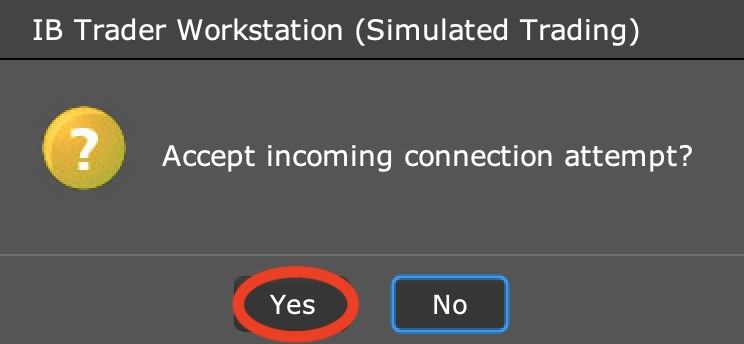
## Get data
[IB Trader Workstation (TWS)](https://www.interactivebrokers.com/en/trading/tws.php) data is stored in
the [deephaven-ib](https://github.com/deephaven-examples/deephaven-ib) client as two dictionaries of tables:
* `tables` contains the tables most users will want.
* `tables_raw` contains raw [IB Trader Workstation (TWS)](https://www.interactivebrokers.com/en/trading/tws.php)
data.
As an example, the `requests` table, that contains all of the requests made to [IB Trader Workstation (TWS)](https://www.interactivebrokers.com/en/trading/tws.php),
can be obtained by:
```python
requests = client.tables["requests"]
```
To display all of the tables in the [Deephaven IDE](https://github.com/deephaven/deephaven-core/blob/main/README.md#run-deephaven-ide),
place the tables in the global namespace. This can most easily be done by:
```python
for k, v in client.tables.items():
globals()[k] = v
```
Similarly, raw tables can be viewed by:
```python
for k, v in client.tables_raw.items():
globals()[k] = v
```
A list of available tables can be obtained by:
```python
print(client.tables.keys())
print(client.tables_raw.keys())
```
## Create a contract
In IB, financial contracts include:
* Stocks
* FX
* Cryptocurrency
* Indexes
* CFDs
* Futures
* Options
* Futures Options
* Bonds
* Mutual Funds
* Warrants
* Commodities
To create a contract for use in [deephaven-ib](https://github.com/deephaven-examples/deephaven-ib),
the contract must first be created as an `ibapi.contract.Contract`. Once the contract is created,
it must be registered with [deephaven-ib](https://github.com/deephaven-examples/deephaven-ib) before it
can be used.
Details on creating contracts can be found at
[https://interactivebrokers.github.io/tws-api/basic_contracts.html](https://interactivebrokers.github.io/tws-api/basic_contracts.html).
Registering the contract causes the contract details to appear in the `contracts_details` table.
```python
from ibapi.contract import Contract
c = Contract()
c.symbol = 'AAPL'
c.secType = 'STK'
c.exchange = 'SMART'
c.currency = 'USD'
rc = client.get_registered_contract(c)
print(rc)
```
[./examples/example_all_functionality.py](./examples/example_all_functionality.py) illustrates the creation and registration
of many different types of contracts.
## Request market data
Market data can be requested from the client using:
* `request_market_data`
* `request_bars_historical`
* `request_bars_realtime`
* `request_tick_data_realtime`
* `request_tick_data_historical`
```python
from ibapi.contract import Contract
import deephaven_ib as dhib
# Use delayed market data if you do not have access to real-time
# client.set_market_data_type(dhib.MarketDataType.DELAYED)
client.set_market_data_type(dhib.MarketDataType.REAL_TIME)
c = Contract()
c.symbol = 'AAPL'
c.secType = 'STK'
c.exchange = 'SMART'
c.currency = 'USD'
rc = client.get_registered_contract(c)
print(rc)
client.request_market_data(rc)
client.request_tick_data_realtime(rc, dhib.TickDataType.BID_ASK)
client.request_tick_data_realtime(rc, dhib.TickDataType.LAST)
client.request_tick_data_realtime(rc, dhib.TickDataType.MIDPOINT)
```
[./examples/example_all_functionality.py](./examples/example_all_functionality.py) illustrates requesting
many kinds of market data.
## Request news
Market data can be requested from the client using:
* `request_news_historical`
* `request_news_article`
```python
from ibapi.contract import Contract
from deephaven.time import to_datetime
contract = Contract()
contract.symbol = "GOOG"
contract.secType = "STK"
contract.currency = "USD"
contract.exchange = "SMART"
rc = client.get_registered_contract(contract)
print(contract)
start = to_datetime("2021-01-01T00:00:00 NY")
end = to_datetime("2021-01-10T00:00:00 NY")
client.request_news_historical(rc, start=start, end=end)
client.request_news_article(provider_code="BRFUPDN", article_id="BRFUPDN$107d53ea")
```
[./examples/example_all_functionality.py](./examples/example_all_functionality.py) illustrates requesting
news data.
## Request account details
Standard account details are requested by default. [IB Trader Workstation (TWS)](https://www.interactivebrokers.com/en/trading/tws.php)
does not provide an API for requesting all model codes, so [deephaven-ib](https://github.com/deephaven-examples/deephaven-ib)
can not subscribe to data for different model codes. If you need details on non-standard
account / model code combinations, you can use:
* `request_account_pnl`
* `request_account_overview`
* `request_account_positions`
## Order management
Orders can be created and canceled using:
* `order_place`
* `order_cancel`
* `order_cancel_all`
To place an order, register a contract with [deephaven-ib](https://github.com/deephaven-examples/deephaven-ib),
and create an `ibapi.order.Order` containing details for the order.
Details on creating orders can be found at [https://interactivebrokers.github.io/tws-api/orders.html](https://interactivebrokers.github.io/tws-api/orders.html).
```python
from ibapi.contract import Contract
from ibapi.order import Order
contract = Contract()
contract.symbol = "GOOG"
contract.secType = "STK"
contract.currency = "USD"
contract.exchange = "SMART"
rc = client.get_registered_contract(contract)
print(contract)
order = Order()
order.account = "DF4943843"
order.action = "BUY"
order.orderType = "LIMIT"
order.totalQuantity = 1
order.lmtPrice = 3000
order.eTradeOnly = False
order.firmQuoteOnly = False
req = client.order_place(rc, order)
req.cancel()
client.order_place(rc, order)
client.order_cancel_all()
```
## Queries and Mathematics
[Deephaven](https://deephaven.io) has very powerful query engine that allows mathematics and queries
to be applied to static and real-time data. The queries can be as simple as filtering data and
as complex as artificial intelligence.
The example below computes the real-time price ratio of `DIA` (Dow Jones Index) and `SPY` (S&P 500 Index)
every 5 seconds.
For more details, see the [Deephaven Coummunity Core Documentation](https://deephaven.io/core/docs/).
```python
from ibapi.contract import Contract
c1 = Contract()
c1.symbol = 'DIA'
c1.secType = 'STK'
c1.exchange = 'SMART'
c1.currency = 'USD'
rc1 = client.get_registered_contract(c1)
print(rc1)
c2 = Contract()
c2.symbol = 'SPY'
c2.secType = 'STK'
c2.exchange = 'SMART'
c2.currency = 'USD'
rc2 = client.get_registered_contract(c2)
print(rc2)
client.set_market_data_type(dhib.MarketDataType.REAL_TIME)
client.request_market_data(rc1)
client.request_market_data(rc2)
client.request_bars_realtime(rc1, bar_type=dhib.BarDataType.MIDPOINT)
client.request_bars_realtime(rc2, bar_type=dhib.BarDataType.MIDPOINT)
bars_realtime = client.tables["bars_realtime"]
bars_dia = bars_realtime.where("Symbol=`DIA`")
bars_spy = bars_realtime.where("Symbol=`SPY`")
bars_joined = bars_dia.view(["Timestamp", "TimestampEnd", "Dia=Close"]) \
.natural_join(bars_spy, on="TimestampEnd", joins="Spy=Close") \
.update("Ratio = Dia/Spy")
```
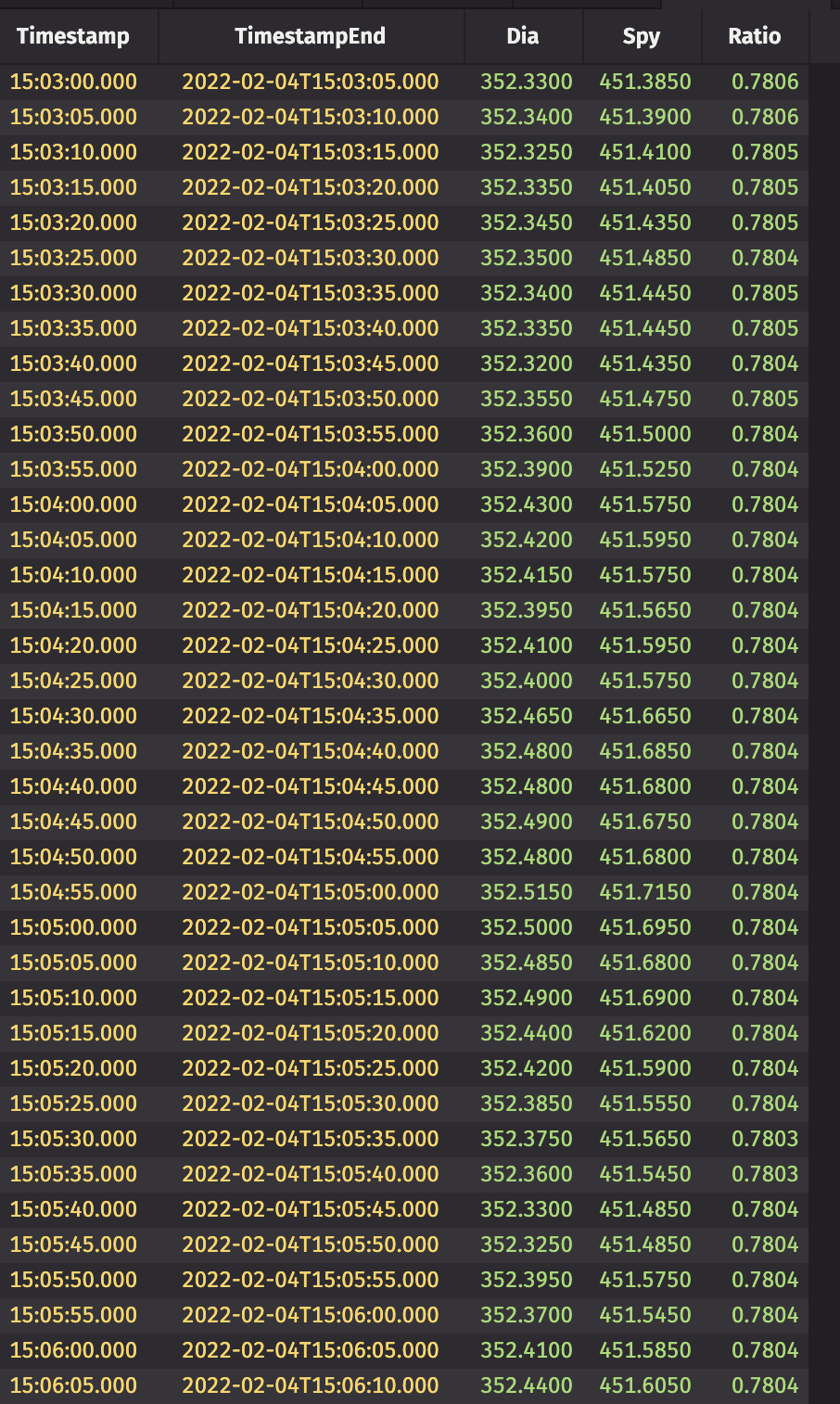
## Plotting
[Deephaven](https://deephaven.io) has very powerful plotting functionality for both static and real-time data.
The example below plots the bid and ask prices of `AAPL` for every tick in the market.
For more details, see the [Deephaven Coummunity Core Documentation](https://deephaven.io/core/docs/).
```python
from ibapi.contract import Contract
c = Contract()
c.symbol = 'AAPL'
c.secType = 'STK'
c.exchange = 'SMART'
c.currency = 'USD'
rc = client.get_registered_contract(c)
print(rc)
client.set_market_data_type(dhib.MarketDataType.REAL_TIME)
client.request_market_data(rc)
client.request_tick_data_realtime(rc, dhib.TickDataType.BID_ASK)
ticks_bid_ask = client.tables["ticks_bid_ask"]
from deephaven.plot import Figure
plot_aapl = Figure().plot_xy("Bid", t=ticks_bid_ask, x="ReceiveTime", y="BidPrice") \
.plot_xy("Ask", t=ticks_bid_ask, x="ReceiveTime", y="AskPrice") \
.show()
```
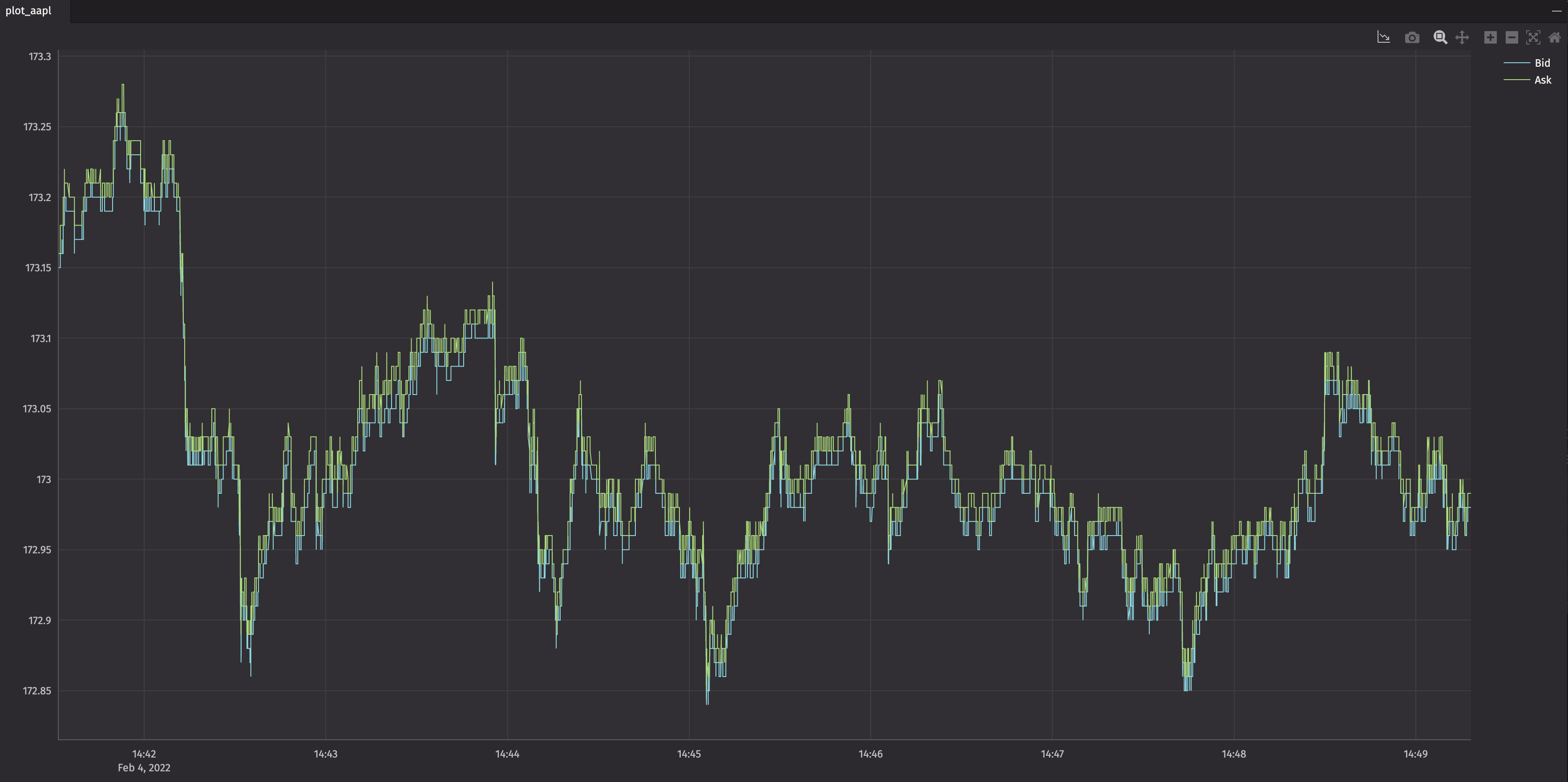
## Help!
### Error Table
[deephaven-ib](https://github.com/deephaven-examples/deephaven-ib) logs all [IB Trader Workstation (TWS)](https://www.interactivebrokers.com/en/trading/tws.php)
errors to the `errors` table. This table should be monitored when using [deephaven-ib](https://github.com/deephaven-examples/deephaven-ib).
```python
errors = client.tables["errors"]
```
### Logging
[deephaven-ib](https://github.com/deephaven-examples/deephaven-ib) and `ibapi` both use Python's
[`logging`](https://docs.python.org/3/howto/logging.html) framework. By default, `ERROR` and higher
levels are logged. More or less logging can be displayed by changing the logging level.
To see fewer log messages:
```python
import logging
logging.basicConfig(level=logging.CRITICAL)
```
To see all log messages:
```python
import logging
logging.basicConfig(level=logging.DEBUG)
```
A discussion of available logging levels can be found in the [Python `logging` module documentation](https://docs.python.org/3/howto/logging.html).
### Support
If you can not solve your problems through either the `errors` table or through logging, you can try:
* [deephaven-ib API Documentation](https://deephaven-examples.github.io/deephaven-ib/)
* [Interactive Brokers Support](https://www.interactivebrokers.com/en/support/individuals.php)
* [Gitter: A relaxed chat room about all things Deephaven](https://gitter.im/deephaven/deephaven)
* [Deephaven Community Slack](https://deephaven.io/slack)
### `Takes N positional arguments but M were given`
You may encounter an error that looks like: `Takes N positional arguments but M were given`. If you see a problem like this, your `ibapi` version does not match the version needed by [deephaven-ib](https://github.com/deephaven-examples/deephaven-ib). The [`ibapi` version in PyPI](https://pypi.org/project/ibapi/) is ancient and appears to have been abandoned by [Interactive Brokers](https://www.interactivebrokers.com/). Currently [Interactive Brokers](https://www.interactivebrokers.com/) is delivering `ibapi` either via the [IB Trader Workstation (TWS)](https://www.interactivebrokers.com/en/trading/tws.php) download or via git.
To check your `ibapi` version:
```python
import ibapi
print(ibapi.__version__)
```
If your version is `9.x`, it is the old version from [PyPI](https://pypi.org/project/ibapi/). To install the required `ibapi` version:
```bash
# pip installed version of ibapi is too old. You must download and install a more recent version.
export IB_VERSION=1016.01
curl -o ./api.zip "https://interactivebrokers.github.io/downloads/twsapi_macunix.${IB_VERSION}.zip"
unzip api.zip
cd ./IBJts/source/pythonclient
python3 setup.py install
```
Note that the `ibapi` API is very unstable. You likely need the exact version mentioned here for [deephaven-ib](https://github.com/deephaven-examples/deephaven-ib) to function. If you want a better installation experience and more flexability with the `ibapi` version, reach out to [Interactive Brokers](https://www.interactivebrokers.com/) and let them know that you want them to start publishing the latest `ibapi` versions to [PyPI](https://pypi.org).
# Examples
Examples can be found in [./examples](./examples).




